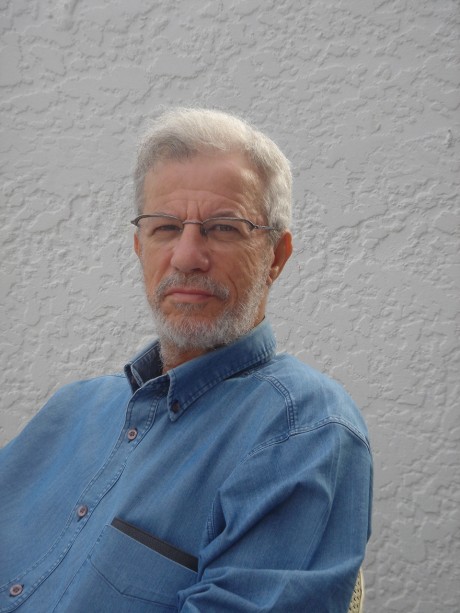Mohammed Bennis Interview
The excellent BANIPAL magazine has just published a solid interview with Moroccan poet Mohammed Bennis conducted by Camilo Gomez-Rivas. Opening paras below. You can access the whole piece here.
Mohammed Bennis lives for literature, and for poetry in particular. Camilo Gomez-Rivas introduces this influential Moroccan literary figure and poet, with an in-depth interview and translations from two of his most important poetry collections.
The semantic shifts one encounters in a single line of poetry by Mohammed Bennis can be startling. Words one had thought to know well appear dissociated from their common senses, taking on unexpected shades of meaning. Even their shapes on the page are plastic, three dimensional. Freed from the usual points of reference, stripped of worn metaphors, the words appear to act of their own volition, with abilities outside traditional usage or grammatical functions.
Upon first meeting with this soft-spoken poet in Mohammedia – a quiet city on the Atlantic coast of Morocco where Bennis has labored steadily at his craft for the last 35 years – one could be forgiven for imagining his life work as the kind resulting solely from a desire for steady formal experimentation. Poetry written in deliberate seclusion, undisturbed by the hubbub of politics, celebrity, or revolutionary social causes. Longer acquaintance with both the man and his work, however, reveals a poet rather more engaged, and one who sees his work as, although subtle, vital to the society in which he lives.
“Poets are the preservers of meaning,” a function, Bennis says, critical for languages that wish to remain alive and relevant. In his poetry, Bennis has tried to create a language of his own that is engaged with reality in a profoundly critical way, an endeavor that poets everywhere would recognize as universal. The strictly national and personal dimensions of Bennis’s work, however, are the result of a long struggle with the particular kind of intellectual repression that characterized his country in the generations following independence from the French.
“When I was young,” Bennis recalls of life in his native Fez, “I found nothing in Morocco that would open the horizons to a cultural life.” While the old city of Fez provided him with an intimate space where he learned about the mysteries of language and death as a boy, as a young man, the city became increasingly stifling intellectually. This feeling became especially poignant after young Bennis, with a gift of a thousand dirhams from his grandmother, was able to travel through Spain and France up to Paris. The year was 1968.
But it was his later struggles with Morocco’s post-independence institutions that proved to be defining in his experience as a cultural actor in his country.
“I went in desiring to change ideas and create a new vision of cultural activity in Morocco and a free Moroccan culture in Arabic,” he says of his reasons for joining the Moroccan Writers’ Union in 1973. “But what I discovered when I joined was that I was with political, not cultural people. I didn’t understand this at first. I was an enthusiastic young man. But slowly, I began to understand that this institution which said about itself that it was a cultural one, was in fact an institution that existed to thwart culture.”


 Poasis II: Selected Poems 2000-2024
Poasis II: Selected Poems 2000-2024 “Todesguge/Deathfugue”
“Todesguge/Deathfugue” “Interglacial Narrows (Poems 1915-2021)”
“Interglacial Narrows (Poems 1915-2021)” “Always the Many, Never the One: Conversations In-between, with Florent Toniello”
“Always the Many, Never the One: Conversations In-between, with Florent Toniello” “Conversations in the Pyrenees”
“Conversations in the Pyrenees” “A Voice Full of Cities: The Collected Essays of Robert Kelly.” Edited by Pierre Joris & Peter Cockelbergh
“A Voice Full of Cities: The Collected Essays of Robert Kelly.” Edited by Pierre Joris & Peter Cockelbergh “An American Suite” (Poems) —Inpatient Press
“An American Suite” (Poems) —Inpatient Press “Arabia (not so) Deserta” : Essays on Maghrebi & Mashreqi Writing & Culture
“Arabia (not so) Deserta” : Essays on Maghrebi & Mashreqi Writing & Culture “Barzakh” (Poems 2000-2012)
“Barzakh” (Poems 2000-2012) “Fox-trails, -tales & -trots”
“Fox-trails, -tales & -trots” “The Agony of I.B.” — A play. Editions PHI & TNL 2016
“The Agony of I.B.” — A play. Editions PHI & TNL 2016 “The Book of U / Le livre des cormorans”
“The Book of U / Le livre des cormorans” “Memory Rose Into Threshold Speech: The Collected Earlier Poetry of Paul Celan”
“Memory Rose Into Threshold Speech: The Collected Earlier Poetry of Paul Celan” “Paul Celan, Microliths They Are, Little Stones”
“Paul Celan, Microliths They Are, Little Stones” “Paul Celan: Breathturn into Timestead-The Collected Later Poetry.” Translated & with commentary by Pierre Joris. Farrar, Straus & Giroux
“Paul Celan: Breathturn into Timestead-The Collected Later Poetry.” Translated & with commentary by Pierre Joris. Farrar, Straus & Giroux